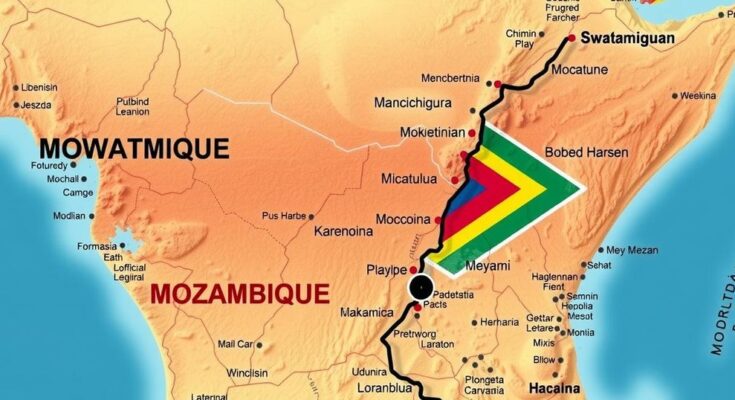Mozambique is experiencing significant political unrest following disputed elections, leading to violence that has disrupted trade and travel with South Africa. Authorities have redirected traffic to Eswatini’s Mananga Border Post as a temporary solution. Calls for dialogue from regional powers provide a glimmer of hope for stabilization amid ongoing challenges.
Amid a political crisis and violent protests following a disputed national election, Mozambique’s situation has escalated, impacting trade and travel with South Africa. The unrest has compelled authorities to redirect travel from the Leebombo Border Post to the Mananga Border Post in Eswatini, which has become a crucial passage for those fleeing the conflict. Although South African officials are managing the crisis, the situation remains challenging, as military and police deployments have been insufficient to cover every area impacted by sporadic protests.
Michael Masiapato, Commissioner of South Africa’s Border Management Authority, noted the complexity of the unrest, stating, “Even … when they deploy the military and when they deploy police officers on the corridor [between the capital, Maputo, and the border], it is not able to cover each and every area.”
The turmoil has intensified following the controversial election of presidential candidate Daniel Chapo, leading to significant fatalities amid ongoing protests. Analysts worry that persistent political violence may destabilize regional security and hinder economic development, potentially leading to increased criminal activity.
Political analyst Solomon Mondlane expressed cautious optimism regarding international efforts for resolution, stating, “The situation is volatile. The good news is we’re hearing more calls from different countries — from South Africa, from other European countries — calling for more dialogue.” He highlighted South Africa’s willingness to facilitate discussions between the opposing factions in Mozambique.
Levy Ndou, a political analyst at Tshwane University of Technology, underscored the importance of continued dialogue, suggesting that should the situation worsen, intervention from the Southern African Development Community (SADC) may become necessary. Zimbabwean President Emmerson Mnangagwa, chair of SADC, has indicated the bloc’s readiness to assist Mozambique during this tumultuous period.
The political unrest in Mozambique stems from controversy surrounding recent elections, notably the victory of presidential candidate Daniel Chapo, which many view as flawed. The aftermath has led to widespread protests, creating a humanitarian crisis as citizens flee violence and seek refuge elsewhere, particularly in neighboring South Africa and Eswatini. This fluctuation in trade and travel routes has prompted government authorities to proffer solutions, while regional leaders advocate for dialogue to stabilize the situation. The potential for further violence poses a threat to southern Africa’s political and economic landscape.
In summary, Mozambique is facing a critical juncture marked by political turmoil and social unrest, prompting the rerouting of trade and travel to alleviate the impact of violence. While South African authorities strive to manage the crisis, the call for dialogue from regional leaders may offer a pathway towards peace. As stakeholders engage in discussions, the stability of Mozambique and its neighbors hinges on a collaborative approach to resolving the underlying conflicts.
Original Source: www.voanews.com




